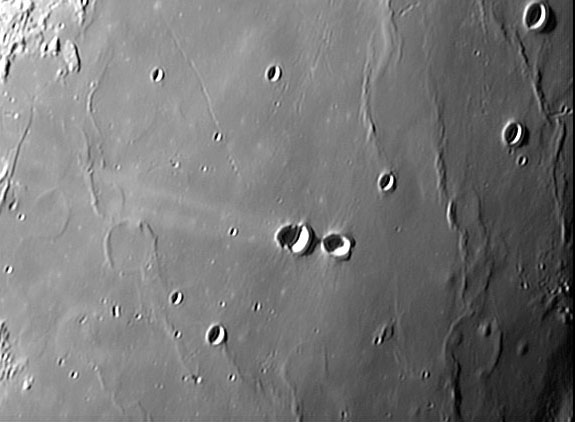Fertility Central

Credit: Gerardo Sbarufatti
Explanation:
Can you imagine an image of the central part of Mare Fecunditatis where Messier is not the most fascinating feature? Here is one! (But, yes, this fantastic image does show the rarely imaged N-S butterfly wing pattern of ejecta at Messier). Starting at the western edge (left side) the well-known Lubbock fault scarp casts a shahow (see mouseover). Both the scarp and the pits on the mare ridge to the east (dhc?) are dark near full Moon and are pyroclastic units. The rille Messier I and its continuing line of collapse pits (the rille continues as a lava tube) are nicely displayed. But what seems to be new - I can't find it on any previous images, NASA or amateur - are the delicate rilles just east and north of Secchi K. Notice that one rille/line of pits runs NW-SE, but the others are more N-S. This image is also full of beautiful ghost craters, consistent with estimates that the mare here is mostly less than 500 m thick. In a ghost crater near the southeast corner is a classic hemispheric dome with a summit pit; other hills nearby seem to be steeper and not obviously domes. A broad, swell-like, possible dome is visible in the southwest corner. This one image, covering an area poorly shown in spacecraft imagery, has revealed new features and demonstrated that every place on the Moon deserves high resolution, low sun imaging!
—
Chuck Wood
Technical Details:
Oct 2, 2004, 00:07 UT. Celestron 8 + 2X barlow + 5,500 um IR cutout filter + Phillips Vesta Pro, 200 sec AVI at 10 fps, 400 best frames used. This remarkable image was taken by Gerardo Sbarufatti but I have not been able to contact him. Gerardo, I hope you will be pleased that your excellent image has been used on LPOD! Note that I have aggressively used the Photoshop "unsharp mask" filter to enhance subtle topo in the mouseover image.
Related Links:
Lunar Orbiter IV Image (Poor)
Rukl Atlas of the Moon Sheet 48
